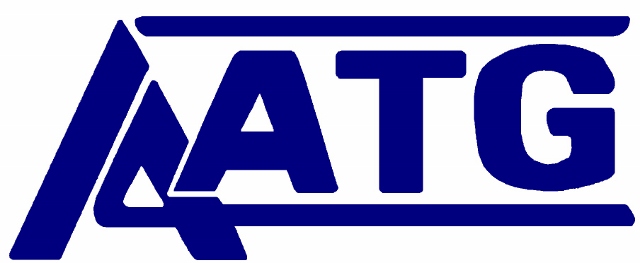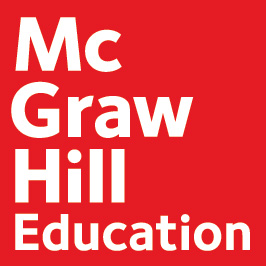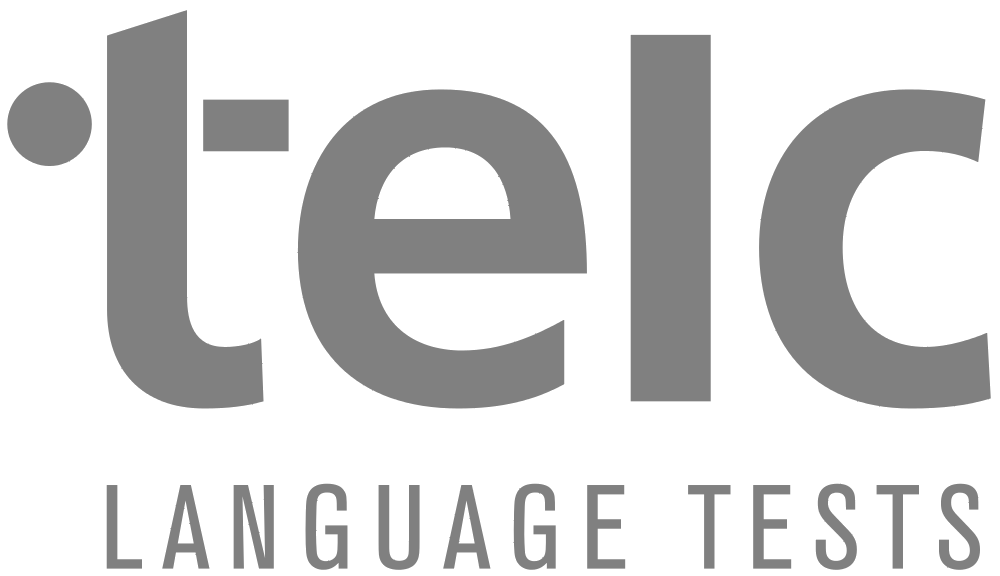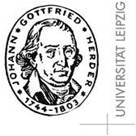The ITT is involved both directly and indirectly (e.g. through the work of its members) in the management, design and organization of various events.
These events include expert symposiums, such as the ACTFL-CEFR symposiums that were held between 2010 and 2013 on finding correspondences between the North American Proficiency Framework and the Common European Framework of Reference, and conferences, such as the 2013 conference on ability profiles for academic language (“Bildungssprachliche Kompetenzprofile”) as well as workshops on the research-based testing and test development and continuing education programs on assessment literacy.
Symposia & Conferences
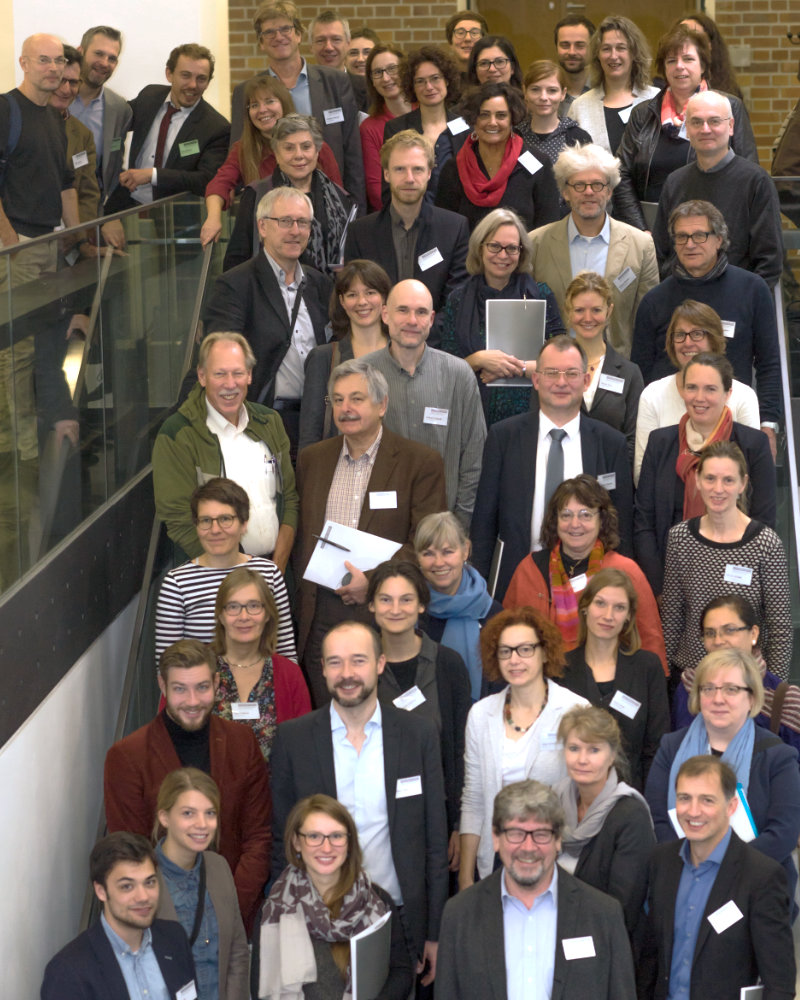
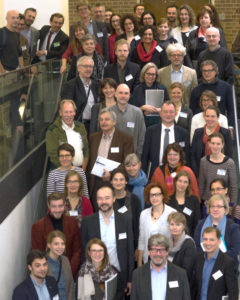
Key to Academic Success: Promoting and Evaluating Language Skills.
The symposium “Key to Academic Success: Promoting and Evaluating Language Skills” was held on November 5, 2016, at Leipzig University. This event was organized by the Language Center and the Herder Institute of Leipzig University, together with the Institute for Test Research and Development, Leipzig.
In addition to a ceremonial opening of the Symposium on November 4th, in the context of which the important work of Prof. Tschirner in the field of German as a Foreign and Second Language was celebrated on the occasion of his 60th birthday, the event primarily explored the current discussions surrounding the (foreign) language requirements that students have to meet during various phases of their education. A special emphasis was placed on the challenges faced by students during transitions between various levels of education, as well as school and university dropout. The main focus was on current research concerning relevant language needs, reliable diagnostics for academic-language skills, and the associated promotion and training of the required language skills for successful academic and educational outcomes in German as a foreign language.
These subjects were discussed on an interdisciplinary basis with a special emphasis on
- the language used in various subject areas,
- the evaluation of academic language;
- the prevention of dropout, and the promotion of academic-language proficiency.
The outcomes of the Symposium were published in a special issue of the journal infoDaF, edited by Olaf Bärenfänger, Katrin Wisniewski, and Denisa Bordag.
ab 08:45:
Anmeldung zur Tagung im 2. OG des Hörsaalgebäudes
ab 09:15 – 9:30:
Begrüßung
Dr. Katrin Wisniewski
Hörsaal 8
ab 09:30 – 10:15
Vortrag
Prof. Dr. Nicole Marx
Förderung, aber welchen Inhalts? – Didaktische Perspektiven auf Bildungssprache(n) im DaF-Unterricht
Abstract
Hörsaal 8
ab 10:15 – 10:45
Pause/Wechsel zur Gruppenarbeit
ab 10:45- 12:00
Gruppenarbeit, Teil 1
Gruppe 1
Sprachliche Entwicklung im Kontext fachlichen Lernens
Prof. Dr. Christian Fandrych, Prof. Dr. Udo Ohm
Hörsaal 15, Info
Gruppe 2 (English)
Evidence for language competence: Reflecting opportunities and challenges of diagnostic instruments and corpora
Prof. Dr. Detmar Meurers, Dr. Barbara Geist
Hörsaal 16, Info
Gruppe 3
Brüche vermeiden/Bildungssprache fördern
Prof. Dr. Nicole Marx, Dr. Cordula Hunold
Hörsaal 17, Info
ab 12:30-13:30
Mittagspause
ab 13:30 – 14:30
Vortrag
Prof. Dr. Detmar Meurers
Do our textbooks foster language development? An exploration of linguistic complexity in Geography textbooks and student writing Abstract
Hörsaal 8
14:15 – 14:30
Pause/Wechsel zur Gruppenarbeit
14:30 – 15:30
Gruppenarbeit, Teil 2
Hörsaal 15, 16, 17
15:30 – 16:00
Pause
16:00 – 16:30
Vorstellung der Ergebnisse der Gruppenarbeit
Hörsaal 8
16:30 – 17:15
Panel Bildungssprache an der Schnittstelle von Fachdidaktik und Bildungspolitik
Prof. Dr. Erwin Tschirner (Universität Leipzig), Prof. Dr. Glenn Levine (University of California, Irvine), Prof. Dr. Winfried Thielmann (Technische Universität Chemnitz), Sebastian Vötter (Goethe-Institut), Prof. Dr. Johanna Watzinger-Tharp (University of Utah)
Hörsaal 8
17:15 – 17:30
Rückblick und Zusammenschau des Symposiums
Prof. Dr. Erwin Tschirner
Hörsaal 8
Key to Academic Success: Promoting and Evaluating Language Skills.
The precise and empirically based description of ability profiles for academic language has always been a desideratum for language (skills) and test research. The closing of this research gap is not only desirable, but also necessary, because, in order to provide academic-language support, guidance, and evaluation for the large number of university students and schoolchildren in Germany who do not speak German as their native language, reliable descriptions of the communicative needs and requirements of this target group are required.
Various scientific disciplines, including applied linguistics, the science of testing, language teaching, subject-related teaching methodology, German as a Foreign Language, and educational science, have already made important contributions to the development of “ability profiles for academic language.” However, interdisciplinary cooperation is often lacking, potential synergy effects are not exploited, and it has not been possible to satisfy the complex and multi-dimensional requirements associated with this objective.
The aim of the event was to bring together some 50 high-ranking scientists from various fields, along with leading representatives of important scientific associations, in order to facilitate scientific exchange and inspire cooperation.
The symposium was able to make a significant contribution towards the identification and initiation of theoretical and practical steps for the important objective of describing “ability profiles for academic language.”
Freitag, 04. Oktober
9:00-11:00
Ankunft und Anmeldung
10:30-11:00
Treffen der Moderatorinnen/Moderatoren und Gruppenleiterinnen/Gruppenleiter
Olaf Bärenfänger
Hörsaal 16
11:00-12:30
Eröffnung und thematische Einführung
Erwin Tschirner (HS 8)
Grußwort
Sibylle Plassmann
Eröffnungsvortrag
Dorry Kenyon und Carsten Wilmes
Lessons from 10 Years of Scaling and Testing the Development of Academic English of Non-English Speaking Schoolchildren in the United States: The Experience of the WIDA Consortium .
13:30-14:45
Schwerpunkt Textkompetenz (HS 8)
Moderation: Michael Becker-Mrotzek
Olaf Hartung
Konzeptionelles Schreiben im Fachunterricht. Vorschläge zur Parametrisierung von Texthandlungen als eine Möglichkeit für Lernstandsdiagnosen.
Elke Sumfleth
Textkompetenz als Teil von Kommunikationskompetenz? Eine Interpretation aus der Chemiedidaktik.
15:15-16:30
Schwerpunkt Bildungsspracherwerb (HS 8)
Moderation: Ilonca Hardy
Katrin Lehnen
Vermittlung eristischer Textkompetenz in der Wissenschaftssprache Deutsch bei Studierenden mit erst-, zweit- und fremdsprachlichen Erwerbskontexten.
Thorsten Pohl
Überlegungen zur Epistemisierung des Unterrichtsdiskurses.
16:45-18:00
Gruppenarbeit 1 (HS 14 – 17)
ab 19.30
Offizieller Empfang im Ratskeller/Neues Rathaus
Samstag, 05. Oktober
09:00-10:15
Schwerpunkt Skalierung von Bildungssprache (HS 8)
Moderation: Gabriele Kniffka
Christoph Kulgemeyer
Verbale Erklärungen in der Physik: Entwicklung eines diagnostischen Instruments und Skalierung von Kompetenzausprägungen bei Lehramtsstudierenden.
Helmut Linneweber-Lammerskitten
Relevanz der Sprachkompetenz für den Mathematikunterricht.
10:30-11:30
Gruppenarbeit 2 (HS 14 – 17)
11:30-12.30
Plenum, Vorstellung der Ergebnisse der Gruppenarbeit (HS 8)
12:45-13:45
Rückblick und Zusammenschau des Symposiums (HS 8)
Erwin Tschirner und Olaf Bärenfänger
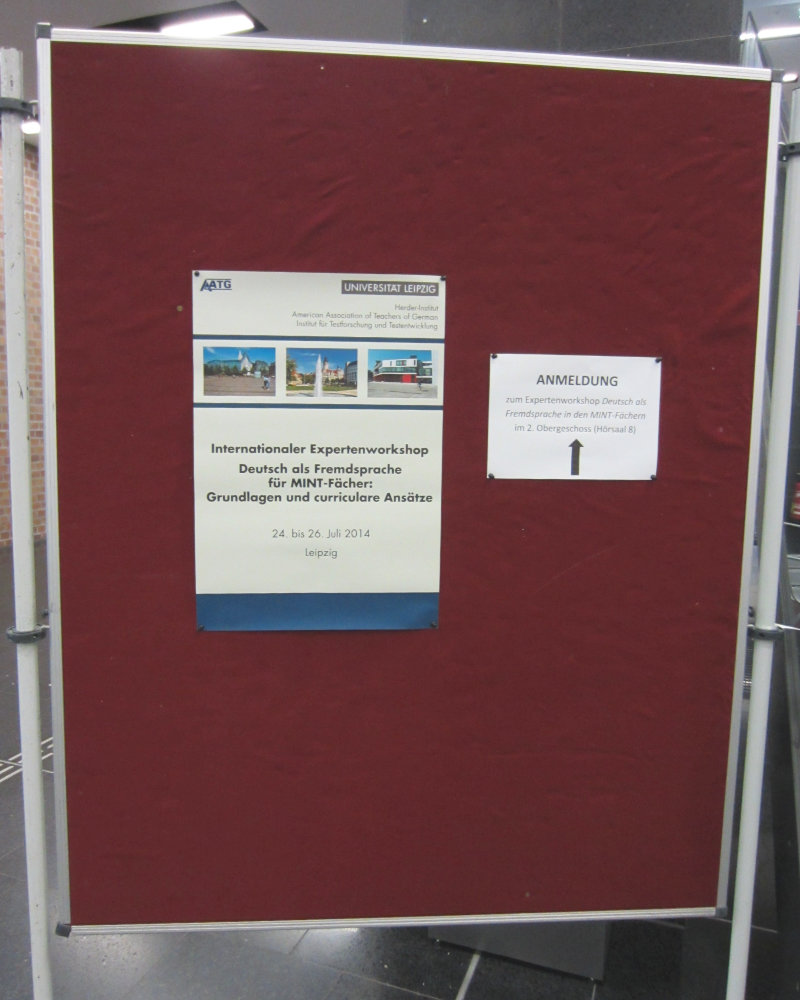
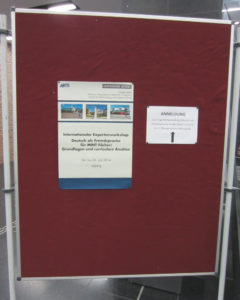
Expert Workshop “German as a Foreign Language for STEM Subjects” in July 2014
The Expert Workshop “German as a Foreign Language for STEM Subjects: Foundations and Curricular Approaches” was held from July 24 to 26, 2014, at Leipzig University. This event was organized by the American Association of Teachers of German (AATG), the Herder Institute of Leipzig University, and the Institute for Test Research and Development, Leipzig.
The aim of the workshop was to bring together approximately 50 colleagues from the field of German as a Foreign Language and German Language and Literature, and the teaching methodologies of the STEM subjects, along with teachers of German as a Foreign Language and teachers of STEM subjects from schools and universities in the US and Germany, in order to investigate and discuss the state of research on the need for language training and further education among teachers, university students, and schoolchildren in the STEM subjects.
In this context, the event sought to pool the diverse areas of expertise of researchers from the US and Germany in order to, on this basis, open up new avenues, both in the development of curricula and teaching materials and in the training and further education of teachers and university lecturers. Another important area of focus was the screening and testing of language skills in the STEM subjects.
The workshop was supported by a grant from the Transatlantic Program of the Federal Republic of Germany using funds from the European Recovery Program (ERP) of the Federal Ministry of Economic Affairs and Energy (BMWi). This event was organized by the American Association of Teachers of German (AATG), the Herder Institute at Leipzig University, the organization interDaF e.V., and the Institute for Test Research and Development, Leipzig.
The 2014 Expert Workshop served as the kickoff for a three-year research and further-education program. In 2015 and 2016 summer schools for German teachers from the US were organized on the basis of the outcomes of the 2014 Workshop. These summer-school programs were hosted by the organization interDaF e.V. in Leipzig.
The workshop proceedings were also summarized in a book entitled Deutsch als zweite Bildungssprache in MINT-Fächern (German as a Second Academic Language in the STEM Subjects), edited by Erwin Tschirner, Jupp Möhring, and Keith Cothrun and published by Stauffenburg Verlag.
Freitag, 25. Juli
10:00-10:30
Kaffeepause
10:00-12:00
Gruppenarbeit 2
Lernziele und Lernwege (HS 14)
Claudia Goll, Karlsruher Institut für
Technologie
Lernmaterialien (HS 15)
Sigurd Piwek, Milwaukee German
Immersion School
K-16 Articulation (HS 16)
Nicole Marx, Universität Bremen
Bildungspolitik, Vernetzung und Inter-
nationalisierung (HS 17)
Hermann Funk, Universität Jena
12:00-12:30
Ergebnisse Gruppenarbeit 2 (HS 8)
12:30-14:00
Mittagspause
14:00-14:30
Plenarvortrag 6 (HS 8)
Ines Busch-Lauer
Westsächsische Hochschule Zwickau
Deutsch-als-Fachsprache im MINT-Bereich
– Merkmale, Erfahrungen und Herausfor-
derungen
14:30-15:00
Plenarvortrag 7 (HS 8)
Thomas Studer
Universität Fribourg
Zum Verhältnis von Sprache und Fach bei
der Leistungsbeurteilung im fremdsprach-
lichen Sachfachunterricht
15:00-15:45
Gruppenarbeit 3
Lehrerbildung (HS 14)
Kristina Peuschel, Universität Leipzig
Sprache und Fach (HS 15)
Katrina Griffin, Anne Arundel County
Public Schools
Assessment (HS 16)
Ray Clifford, Brigham Young Univer-
sity
Bildungssprachl. Grundlagen (HS 17)
Damon Rarick, University of Rhode Is-
land
15:45-16:15
Kaffeepause
16:15-17:00
Gruppenarbeit 3 (Fortsetzung)
17:00-17:30
Ergebnisse Gruppenarbeit 3 (HS 8)
Ab 19:00
Offizieller Empfang
im Ratskeller/Neues Rathaus (Seite 31)
Samstag, 26. Juli
09:00-09:30
Plenarvortrag 8 (HS 8)
Erwin Tschirner
Herder-Institut, Universität Leipzig
Lehren und Lernen in MINT-Fächern im
Spannungsfeld
zwischen
Bildungs-
sprache, Fachwissen und Fremdsprachen-
erwerb
09:30-10:15
Gruppenarbeit 4
Lehrerbildung (HS 14)
Kristina Peuschel, Universität Leipzig
Sprache und Fach (HS 15)
Katrina Griffin, Anne Arundel County
Public Schools
Assessment (HS 16)
Ray Clifford, Brigham Young University
Bildungssprachl. Grundlagen (HS 17)
Damon Rarick, University of Rhode
Island
10:15-10:45
Kaffeepause
10:45-11:30
Gruppenarbeit 4 (Fortsetzung)
11:30-12:00
Ergebnisse Gruppenarbeit 4 (HS 8)
12:00-13:00
Plenardiskussion (HS 8)
Konferenzergebnisse Erwin Tschirner
-Mohamed Esa
-Johanna Watzinger-Tharp
-Thomas Studer
13:00-14:30
Mittagessen
15:00-17:00
Stadtführung (Seite 32)
Expert Workshop “German as a Foreign Language for STEM Subjects” in July 2014
The Expert Workshop “German as a Foreign Language for STEM Subjects: Foundations and Curricular Approaches” was held from July 24 to 26, 2014, at Leipzig University. This event was organized by the American Association of Teachers of German (AATG), the Herder Institute of Leipzig University, and the Institute for Test Research and Development, Leipzig.
The aim of the workshop was to bring together approximately 50 colleagues from the field of German as a Foreign Language and German Language and Literature, and the teaching methodologies of the STEM subjects, along with teachers of German as a Foreign Language and teachers of STEM subjects from schools and universities in the US and Germany, in order to investigate and discuss the state of research on the need for language training and further education among teachers, university students, and schoolchildren in the STEM subjects.
In this context, the event sought to pool the diverse areas of expertise of researchers from the US and Germany in order to, on this basis, open up new avenues, both in the development of curricula and teaching materials and in the training and further education of teachers and university lecturers. Another important area of focus was the screening and testing of language skills in the STEM subjects.
The workshop was supported by a grant from the Transatlantic Program of the Federal Republic of Germany using funds from the European Recovery Program (ERP) of the Federal Ministry of Economic Affairs and Energy (BMWi). This event was organized by the American Association of Teachers of German (AATG), the Herder Institute at Leipzig University, the organization interDaF e.V., and the Institute for Test Research and Development, Leipzig.
The 2014 Expert Workshop served as the kickoff for a three-year research and further-education program. In 2015 and 2016 summer schools for German teachers from the US were organized on the basis of the outcomes of the 2014 Workshop. These summer-school programs were hosted by the organization interDaF e.V. in Leipzig.
The workshop proceedings were also summarized in a book entitled Deutsch als zweite Bildungssprache in MINT-Fächern (German as a Second Academic Language in the STEM Subjects), edited by Erwin Tschirner, Jupp Möhring, and Keith Cothrun and published by Stauffenburg Verlag.
Freitag, 25. Juli
10:00-10:30
Kaffeepause
10:00-12:00
Gruppenarbeit 2
Lernziele und Lernwege (HS 14)
Claudia Goll, Karlsruher Institut für
Technologie
Lernmaterialien (HS 15)
Sigurd Piwek, Milwaukee German
Immersion School
K-16 Articulation (HS 16)
Nicole Marx, Universität Bremen
Bildungspolitik, Vernetzung und Inter-
nationalisierung (HS 17)
Hermann Funk, Universität Jena
12:00-12:30
Ergebnisse Gruppenarbeit 2 (HS 8)
12:30-14:00
Mittagspause
14:00-14:30
Plenarvortrag 6 (HS 8)
Ines Busch-Lauer
Westsächsische Hochschule Zwickau
Deutsch-als-Fachsprache im MINT-Bereich
– Merkmale, Erfahrungen und Herausfor-
derungen
14:30-15:00
Plenarvortrag 7 (HS 8)
Thomas Studer
Universität Fribourg
Zum Verhältnis von Sprache und Fach bei
der Leistungsbeurteilung im fremdsprach-
lichen Sachfachunterricht
15:00-15:45
Gruppenarbeit 3
Lehrerbildung (HS 14)
Kristina Peuschel, Universität Leipzig
Sprache und Fach (HS 15)
Katrina Griffin, Anne Arundel County
Public Schools
Assessment (HS 16)
Ray Clifford, Brigham Young Univer-
sity
Bildungssprachl. Grundlagen (HS 17)
Damon Rarick, University of Rhode Is-
land
15:45-16:15
Kaffeepause
16:15-17:00
Gruppenarbeit 3 (Fortsetzung)
17:00-17:30
Ergebnisse Gruppenarbeit 3 (HS 8)
Ab 19:00
Offizieller Empfang
im Ratskeller/Neues Rathaus (Seite 31)
Samstag, 26. Juli
09:00-09:30
Plenarvortrag 8 (HS 8)
Erwin Tschirner
Herder-Institut, Universität Leipzig
Lehren und Lernen in MINT-Fächern im
Spannungsfeld
zwischen
Bildungs-
sprache, Fachwissen und Fremdsprachen-
erwerb
09:30-10:15
Gruppenarbeit 4
Lehrerbildung (HS 14)
Kristina Peuschel, Universität Leipzig
Sprache und Fach (HS 15)
Katrina Griffin, Anne Arundel County
Public Schools
Assessment (HS 16)
Ray Clifford, Brigham Young University
Bildungssprachl. Grundlagen (HS 17)
Damon Rarick, University of Rhode
Island
10:15-10:45
Kaffeepause
10:45-11:30
Gruppenarbeit 4 (Fortsetzung)
11:30-12:00
Ergebnisse Gruppenarbeit 4 (HS 8)
12:00-13:00
Plenardiskussion (HS 8)
Konferenzergebnisse Erwin Tschirner
-Mohamed Esa
-Johanna Watzinger-Tharp
-Thomas Studer
13:00-14:30
Mittagessen
15:00-17:00
Stadtführung (Seite 32)
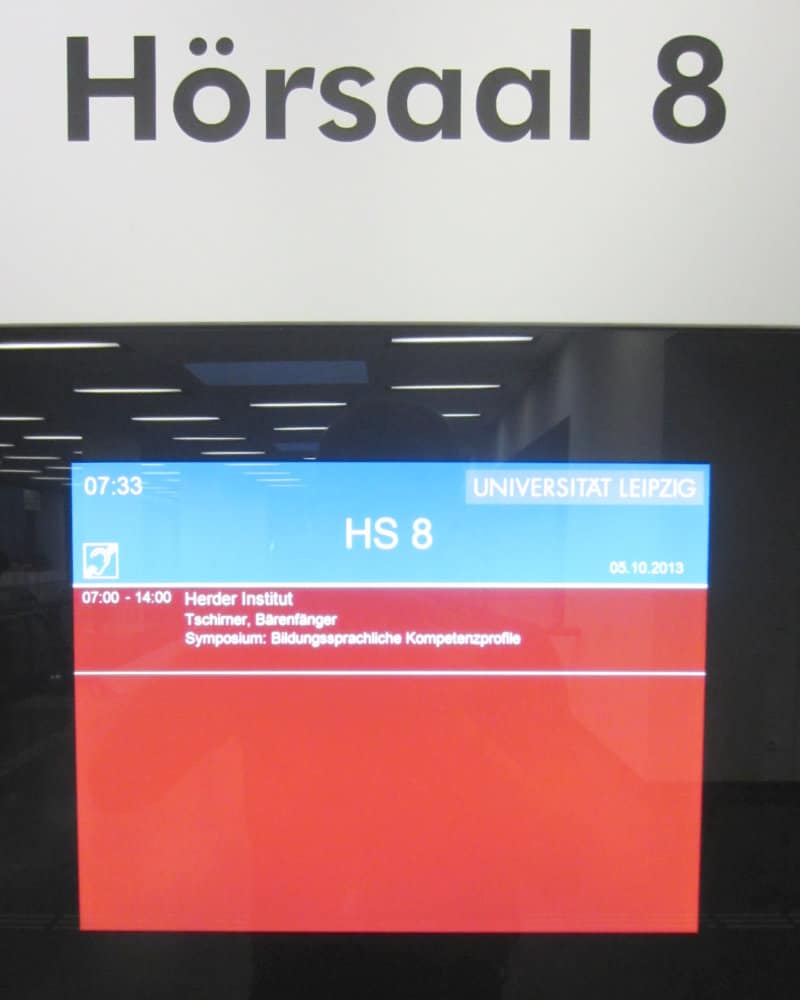
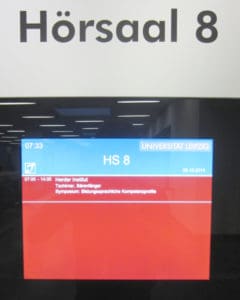
Symposium on Academic Language 2013
The precise and empirically based description of ability profiles for academic language has always been a desideratum for language (skills) and test research. The closing of this research gap is not only desirable, but also necessary, because, in order to provide academic-language support, guidance, and evaluation for the large number of university students and schoolchildren in Germany who do not speak German as their native language, reliable descriptions of the communicative needs and requirements of this target group are required.
Various scientific disciplines, including applied linguistics, the science of testing, language teaching, subject-related teaching methodology, German as a Foreign Language, and educational science, have already made important contributions to the development of “ability profiles for academic language.” However, interdisciplinary cooperation is often lacking, potential synergy effects are not exploited, and it has not been possible to satisfy the complex and multi-dimensional requirements associated with this objective.
The aim of the event was to bring together some 50 high-ranking scientists from various fields, along with leading representatives of important scientific associations, in order to facilitate scientific exchange and inspire cooperation.
The symposium was able to make a significant contribution towards the identification and initiation of theoretical and practical steps for the important objective of describing “ability profiles for academic language.”
Freitag, 04. Oktober
9:00-11:00
Ankunft und Anmeldung
10:30-11:00
Treffen der Moderatorinnen/Moderatoren und Gruppenleiterinnen/Gruppenleiter
Olaf Bärenfänger
Hörsaal 16
11:00-12:30
Eröffnung und thematische Einführung
Erwin Tschirner (HS 8)
Grußwort
Sibylle Plassmann
Eröffnungsvortrag
Dorry Kenyon und Carsten Wilmes
Lessons from 10 Years of Scaling and Testing the Development of Academic English of Non-English Speaking Schoolchildren in the United States: The Experience of the WIDA Consortium .
13:30-14:45
Schwerpunkt Textkompetenz (HS 8)
Moderation: Michael Becker-Mrotzek
Olaf Hartung
Konzeptionelles Schreiben im Fachunterricht. Vorschläge zur Parametrisierung von Texthandlungen als eine Möglichkeit für Lernstandsdiagnosen.
Elke Sumfleth
Textkompetenz als Teil von Kommunikationskompetenz? Eine Interpretation aus der Chemiedidaktik.
15:15-16:30
Schwerpunkt Bildungsspracherwerb (HS 8)
Moderation: Ilonca Hardy
Katrin Lehnen
Vermittlung eristischer Textkompetenz in der Wissenschaftssprache Deutsch bei Studierenden mit erst-, zweit- und fremdsprachlichen Erwerbskontexten.
Thorsten Pohl
Überlegungen zur Epistemisierung des Unterrichtsdiskurses.
16:45-18:00
Gruppenarbeit 1 (HS 14 – 17)
ab 19.30
Offizieller Empfang im Ratskeller/Neues Rathaus
Samstag, 05. Oktober
09:00-10:15
Schwerpunkt Skalierung von Bildungssprache (HS 8)
Moderation: Gabriele Kniffka
Christoph Kulgemeyer
Verbale Erklärungen in der Physik: Entwicklung eines diagnostischen Instruments und Skalierung von Kompetenzausprägungen bei Lehramtsstudierenden.
Helmut Linneweber-Lammerskitten
Relevanz der Sprachkompetenz für den Mathematikunterricht.
10:30-11:30
Gruppenarbeit 2 (HS 14 – 17)
11:30-12.30
Plenum, Vorstellung der Ergebnisse der Gruppenarbeit (HS 8)
12:45-13:45
Rückblick und Zusammenschau des Symposiums (HS 8)
Erwin Tschirner und Olaf Bärenfänger
Symposium on Academic Language 2013
The precise and empirically based description of ability profiles for academic language has always been a desideratum for language (skills) and test research. The closing of this research gap is not only desirable, but also necessary, because, in order to provide academic-language support, guidance, and evaluation for the large number of university students and schoolchildren in Germany who do not speak German as their native language, reliable descriptions of the communicative needs and requirements of this target group are required.
Various scientific disciplines, including applied linguistics, the science of testing, language teaching, subject-related teaching methodology, German as a Foreign Language, and educational science, have already made important contributions to the development of “ability profiles for academic language.” However, interdisciplinary cooperation is often lacking, potential synergy effects are not exploited, and it has not been possible to satisfy the complex and multi-dimensional requirements associated with this objective.
The aim of the event was to bring together some 50 high-ranking scientists from various fields, along with leading representatives of important scientific associations, in order to facilitate scientific exchange and inspire cooperation.
The symposium was able to make a significant contribution towards the identification and initiation of theoretical and practical steps for the important objective of describing “ability profiles for academic language.”
Freitag, 04. Oktober
9:00-11:00
Ankunft und Anmeldung
10:30-11:00
Treffen der Moderatorinnen/Moderatoren und Gruppenleiterinnen/Gruppenleiter
Olaf Bärenfänger
Hörsaal 16
11:00-12:30
Eröffnung und thematische Einführung
Erwin Tschirner (HS 8)
Grußwort
Sibylle Plassmann
Eröffnungsvortrag
Dorry Kenyon und Carsten Wilmes
Lessons from 10 Years of Scaling and Testing the Development of Academic English of Non-English Speaking Schoolchildren in the United States: The Experience of the WIDA Consortium .
13:30-14:45
Schwerpunkt Textkompetenz (HS 8)
Moderation: Michael Becker-Mrotzek
Olaf Hartung
Konzeptionelles Schreiben im Fachunterricht. Vorschläge zur Parametrisierung von Texthandlungen als eine Möglichkeit für Lernstandsdiagnosen.
Elke Sumfleth
Textkompetenz als Teil von Kommunikationskompetenz? Eine Interpretation aus der Chemiedidaktik.
15:15-16:30
Schwerpunkt Bildungsspracherwerb (HS 8)
Moderation: Ilonca Hardy
Katrin Lehnen
Vermittlung eristischer Textkompetenz in der Wissenschaftssprache Deutsch bei Studierenden mit erst-, zweit- und fremdsprachlichen Erwerbskontexten.
Thorsten Pohl
Überlegungen zur Epistemisierung des Unterrichtsdiskurses.
16:45-18:00
Gruppenarbeit 1 (HS 14 – 17)
ab 19.30
Offizieller Empfang im Ratskeller/Neues Rathaus
Samstag, 05. Oktober
09:00-10:15
Schwerpunkt Skalierung von Bildungssprache (HS 8)
Moderation: Gabriele Kniffka
Christoph Kulgemeyer
Verbale Erklärungen in der Physik: Entwicklung eines diagnostischen Instruments und Skalierung von Kompetenzausprägungen bei Lehramtsstudierenden.
Helmut Linneweber-Lammerskitten
Relevanz der Sprachkompetenz für den Mathematikunterricht.
10:30-11:30
Gruppenarbeit 2 (HS 14 – 17)
11:30-12.30
Plenum, Vorstellung der Ergebnisse der Gruppenarbeit (HS 8)
12:45-13:45
Rückblick und Zusammenschau des Symposiums (HS 8)
Erwin Tschirner und Olaf Bärenfänger
ITT Lectures
The ITT e.V. organizes regular guest lectures. These events are open to all interested individuals.
Previous Guest Lectures
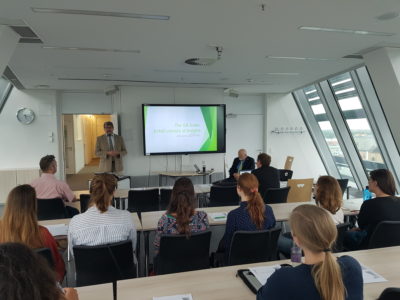
2018
Pardee Lowe, Jr.
The ILR Scale – a Half-Century of Insights
Abstract
What happens when a unique situation arises and a truly new testing system must be created? This presentation looks at the requirements that occasioned the devising of the US Government’s Interagency Language (ILR) Scale in the mid-1950s and how it has fared ever since. Initially, outsiders questioned its feasibility and effectiveness. The presenter, who wrote the first full scale Oral Proficiency Interview (OPI) manual and co-authored the handbook on text evaluation according to the ILR scale, has at various times sat, been chair or co-chair of most of the ILR committees, as well as been a member of the committees that revise the extant ILR Language Skill Level Descriptions and help on those that have created the newest ones. He has trained both the initial generation of OPI testers and trainers at the Defense Language Institute’s Foreign Language Center (Monterey, CA) as well as the initial generation of OPI testers and trainers at American Council for teaching Foreign Language. Moreover, he trained both these groups in text evaluation. In this presentation he delves into the „hows“ and „whys“ of the ILR scale’s working and shares both some of its quirks and some of the ways in which it has proved revolutionary, seminal, and transformative!
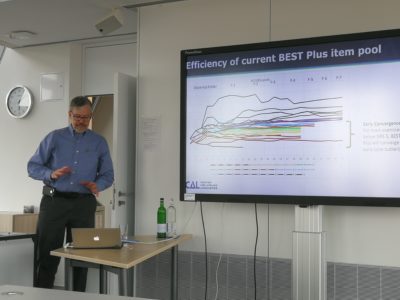
2018
Dorry Kenyon
The Scripted Oral Interview: Can Technology and Advanced Psychometrics Improve its Potential?
Abstract
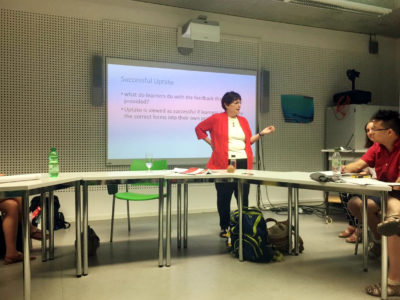
2017
Prof. Dr. Susan Gass
Learning to listen: To caption or not?
Abstract
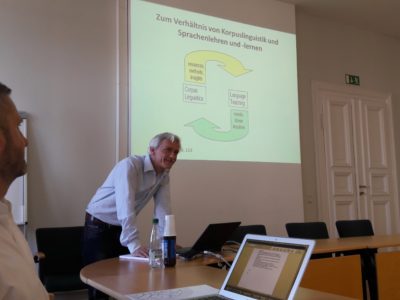
2016
Prof. Dr. Thomas Studer
“Machen Lernerkorpora Schule?” (“Are Learner Corpora Catching On?”)
Abstract
Location: Neuer Senatssaal, Ritterstraße 26, 04109 Leipzig
Time: June 6, 2016, 5:00 p.m.
More information on Prof. Dr. Thomas Studer can be found here.
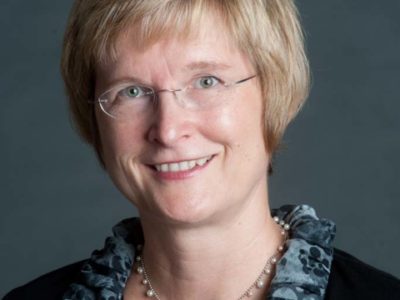
2015
Prof. Dr. Martina Lindseth
“Die Entwicklung mündlicher Kompetenz
während eines Semesters im Ausland
und an der Heimatuniversität.” (The development of oral language skills during a semester abroad and at the student’s home university.)
Abstract to follow.
Workshops
One of the core activities of the ITT is the development and delivery of workshops.
In addition to individual focus areas, the following are some examples of the topics and questions that are covered in the continuing education events offered by the ITT:
How can oral proficiency be validly and reliably assessed through low- and high-stakes tests?
What makes a good test for reading or listening proficiency?
What are the most common test-design mistakes, and how can they be avoided?
What are the characteristics of a good listening or reading text, and how should items be designed?
How do I ensure that a test is construct- and theory-based?
How can theories and scales be adapted to meet the requirements of specific target groups?
Which testing instruments are suitable for the assessment of learning progress in a classroom context, and how does one apply these instruments?
Which statistical methods are suitable for quality assurance in language-proficiency testing?
Past Workshops
Sprachmittlung im Companion Volume: Was ist neu und was bedeutet das für den Unterricht?
Bärenfänger, Olaf
Goethe-Instituts Prag und DAAD Prag 11. Dez.
Sprachkompetenzen internationaler Studierender. Abschlussworkshop Wege von Geflüchteten an deutsche Hochschulen.
Möhring, Jupp; Wisniewski, Katrin
DZHW, online 07. – 08. Dez.
Mündliche Prüfungen zum Nachweis sprachlicher Studierfähigkeit.
Möhring, Jupp
Friedrich-Schiller-Universität, Jena. 07. Feb.
Berufsbezogene Deutschförderung: Zur Systematik und zu inhaltlichen Anforderungen an Lernziele.
Bärenfänger, Olaf
telc, Frankfurt a. M. 11, Apr.
Anforderungen und Struktur von Lernzielen für die berufsbezogene Deutschförderung: Ein Werkstattseminar.
Bärenfänger, Olaf
telc, Frankfurt a. M. 4, Apr.
Berufsbezogene Deutschförderung: Zur Entwicklung von Lernzielkatalogen.
Bärenfänger, Olaf
BAMF, Berlin 24, Jan.
Zur Entwicklung von Lernzielkatalogen für die berufsbezogene Deutschförderung: Ein Werkstattseminar.
Bärenfänger, Olaf
telc, Frankfurt a. M. 4, Jan.
Assessing Language Abilities in First-Year College Programs
Tschirner, Erwin
Workshop Language Testing International (LTI), White Plains (NY), USA 7, Sep.
The ACTFL Reading Proficiency Test (RPT)
Tschirner, Erwin
Workshop Foreign Service Institute (FSI), Arlington (VA), USA 21, Aug.
Der rezeptive Wortschatzbedarf von Fremdsprachenlernern
Tschirner, Erwin
Workshop TU München, Sprachenzentrum 27, Apr.
Workshop zur Messung von Deutschkenntnissen für den Arbeitsmarkt
Bärenfänger, Olaf; Ide, Robin
Genossenschaft Migros Zürich, Schweiz 13-16, Feb.
Zentrale Aspekte bei der Bewertung von Sprech- und Lesekompetenzen im Bereich Deutsch als Fremdsprache
Möhring, Jupp
Andalusische Germanistenverband AGA, Universidade de Sevilla, Sevilla, Spanien
Validating the OPI+ Using the Assessment Use Argument.
Tschirner, Erwin; Bärenfänger, Olaf
Workshop bei Naval Special Warfare, Coronado, CA, USA 16.-17. Mai.
Curriculumplanung für die Studiengänge Germanistik und DaF an der Nationaluniversität Hanoi
Möhring, Jupp
Leitung der Arbeitsgruppe “Testen und Prüfen” (gemeinsam mit Albrecht Klemm), Universität Leipzig, Deutschland
Assessing Literacy – Gute und nützliche Tests für die Schule erstellen
Bärenfänger, Olaf
Weiterbildung für FremdsprachenlehrerInnen, Dresden, Deutschland
Faire und vergleichbare Tests entwickeln
Bärenfänger, Olaf
Workshop am Sprachenzentrum der Universität Leipzig, Deutschland




